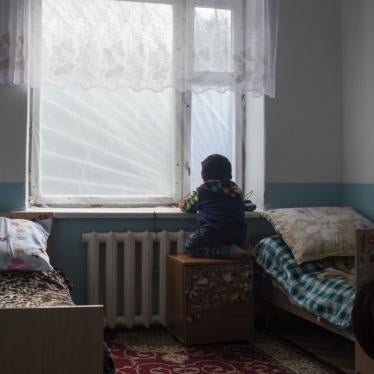(Moscow) – Russia should move quickly to reform laws and practices that currently prevent the 13 million Russians with disabilities from enjoying equal rights, Human Rights Watch said today. President Dmitry Medvedev signed a federal law on May 3, 2012, formally ratifying the Convention on the Rights of People with Disabilities (CRPD).
"President Medvedev’s move signals a moment of opportunity for the 13 million people with disabilities in Russia,” said Shantha Rau Barriga, disability rights researcher and advocate at Human Rights Watch. “Now theRussian government needs to translate the guarantees in the convention into domestic legal reform and combat the pervasive discrimination against people with disabilities."
People with disabilities in Russia face a range of barriers that limit their participation in society. For example, public buildings and transportation are often inaccessible to people with physical disabilities. People with mental disabilities are confined to institutions for long periods of time, against their will, without appropriate legal safeguards for their rights.
Only 2 percent of Russian schools have an inclusive education approach, in which children with and without disabilities attend school together, the United Nations Childrens’ Fund (UNICEF) says. The government has said it intends to expand inclusive education to 50 percent of schools by 2015. But reaching that goal will require a comprehensive plan to improve school infrastructure, train teachers, and educate parents and the community about the benefits of inclusive education, Human Rights Watch said.
The Disability Rights Convention affirms broad guarantees for people with disabilities, including the rights to life, freedom from discrimination and arbitrary detention, equal recognition before the law, and access to justice, education, employment, and health. According to the World Bank, there are an estimated one billion people with disabilities around the world.
“Ratification of this landmark treaty signifies a key commitment toward making Russian society more inclusive and accessible,” Barriga said. “Respect for human rights in Russia has taken a battering over the past few years, but this is a positive sign.”
Human Rights Watch also urged Russia to sign and ratify the Optional Protocol to the Disability Rights Convention, which allows individuals or groups to complain to an international monitoring body if they believe that their rights under the Convention have been violated.
To date, 112 countries have ratified the Disability Rights Convention, and 64 countries have ratified the Optional Protocol. For Russia’s ratification to be completed, the government must submit the necessary legal instruments to the United Nations secretary-general.








